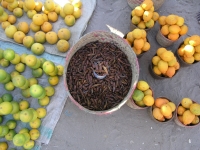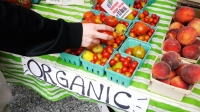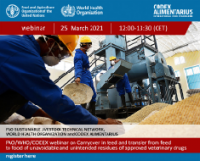News

29/04/2021
Having comparable levels of capacities across countries to ensure food safety can be a challenge. While implementing food safety measures reduces the toll foodborne diseases can take on human health, trade and productivity, interventions are less effective when the limited capacities of one country affect the more advanced capacities of another.
FAO established a series of multi-year projects, funded by the government of Japan, aimed at enhancing capacities to develop and implement international food safety standards in countries that are members of the Association of Southeast Asian Nations (ASEAN). The project led to results that have contributed to improving consumer health...

27/04/2021
Smallholder animal production has vital economic, practical and social value, and it is often linked with traditional and cultural practices. However, in addition to zoonotic risks, farming and slaughter practices may have a negative impact on food safety, the environment and biosecurity. Following simple measures can help ensure hygiene and safety.
In April 2021, the FAO Regional Office for Asia and the Pacific published a booklet entitled “Backyard farming and slaughtering – Keeping tradition safe”. This concise resource summarizes how the production of animal-derived food is linked to food safety and it outlines possible measures to mitigate the risks...

22/04/2021
Addressing antimicrobial resistance (AMR) can be a challenge from a legislative perspective: AMR is often defined as the quintessential food safety issue because it involves food, humans, animals and the environment. It would be time-consuming and confusing to create new legislation that addresses an issue covering so many different areas. Instead, legislation that already exists can be revised by looking at it through new lenses to help slow down the spread of AMR.
In April 2021, the FAO Regional Office for Asia and the Pacific published a booklet entitled “Slowing down superbugs – Legislation and antimicrobial resistance”. This concise resource outlines how existing legislation that is relevant to the problem can be adapted, rather than creating ad hoc legislation on...

09/04/2021
Edible insects can diversify diets, improve livelihoods, contribute to food and nutrition security and have a lower ecological footprint as compared to other sources of protein. These potential benefits combined with a heightened interest in exploring alternative sources of food that are both nutritious and environmentally sustainable are spurring commercial production of insects as food and animal feed.
While acknowledging the different opportunities that the sector might bring, this publication analyses the food safety implications associated with edible insects. Some key potential food safety hazards for edible insects are considered in this publication - biological (bacteria, virus, fungi, parasites), chemical (mycotoxins,...

02/04/2021
World Food Safety Day planning is underway. Initiatives will be held around the world and not just on 7 June. Last year events started in May and ran until August. FAO and the World Health Organization (WHO) are planning an online event for 7 June 2021 under the theme ‘Safe food now for a healthy tomorrow.’ Campaign messaging will continue to feature the slogan ‘Food safety is everyone’s business’.
Are you looking to take part? There are numerous ways in which you can do so. Whether you have time for a simple tweet or want to get more involved, UN Days...

31/03/2021
Organic food is often seen by consumers as healthy, tasty and environmentally friendly, but the organic food certification is not necessarily a synonym for safe food. Organic refers to a product that has been produced in accordance with certain standards throughout the production, handling, processing and marketing stages; it does not refer to the characteristics and properties of the finished product.
In fact, “organic” certification actually indicates the implementation of standards which aim at a different set of benefits: better incomes for small-scale farmers and increased food security, environmental benefits such as improved soil and water quality and biodiversity preservation, and...

26/03/2021
Detecting food fraud is a challenge and consumers who fall prey may find their wallets, trust and even their health damaged as a result. Food safety professionals around the world are dedicated to ensuring that food is safe, but blind spots in food supply chains can provide opportunities for individuals and businesses to conduct food fraud.
Several factors make detection and prevention of food fraud difficult. First, it is not always clear what is meant by food fraud and where the line between food fraud and marketing lies. Second, it may be difficult or impossible for consumers to detect food fraud...

24/03/2021
In his keynote address at the 2021 Global Food Safety Initiative Conference, FAO Director-General QU Dongyu emphasized the urgent need for agri-food system transformation to end hunger and malnutrition and feed everyone on the planet safe and nutritious food. He highlighted several ways to move towards efficient and sustainable agri-food systems.
This year, the three-day conference is being held virtually and centres on a theme of ‘Food Safety: Rethink, Reset, Recharge’. The annual international conference draws more than 1 200 food industry leaders from more than 50 countries to ‘share knowledge, showcase their learnings and do business’.
The photo above, courtesy of...

19/03/2021
Manufacturers of feed and feed ingredients, livestock farmers, animal source food producers, distributors and salers need to collaborate to identify and manage potential health threats. Collaboration between these entities enables the development and application of appropriate risk management strategies for safe production and use of medicated animal feed. FAO and WHO convened an expert meeting to review the causes of veterinary drug carryover in animal feed and transfer to food, the known risks of such carryover to human health and international trade and suggest appropriate risk management strategies. The report of this expert meeting will be forwarded to Codex Committee on Residues of Veterinary Drugs...

16/03/2021
Foodborne parasitic diseases do not always receive priorities in national food control systems. Although they can cause both acute and chronic health problems, limited detection and surveillance capacities and extreme under-reporting by those afflicted make the problems invisible to the authorities and the public.
In March 2021, FAO Regional Office for Asia and the Pacific published a booklet entitled “Parasites in foods - an invisible threat”. This concise resource explains the reality of the negative impacts of parasites in food, and provides recommendations for the food safety competent authorities with practical actions to mitigate and manage these neglected diseases.
Parasitic...
Stay up to date and connect to our RSS feed!
